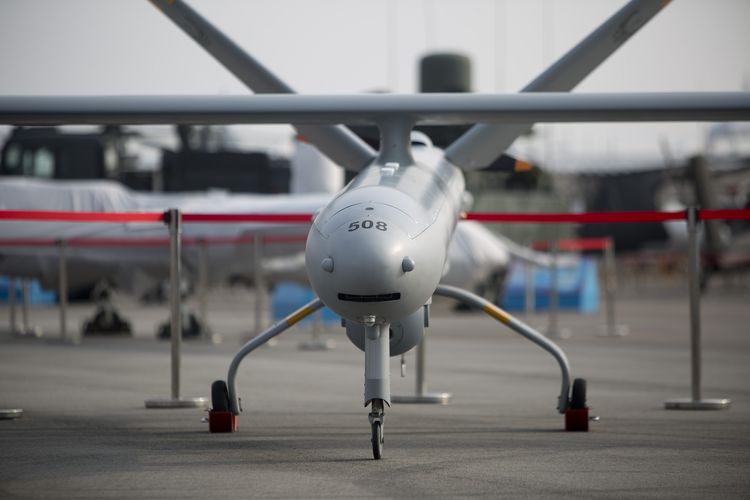U.S. military spending may be flat, but that’s not proving to be much of a problem for Israeli defense company Elbit Systems Ltd.
That’s because the company, while long dependent on the U.S. for much of its sales, has been shifting its focus to faster growing markets in Asia and Latin America. Elbit said last month that demand from those regions helped push up its backlog of orders to $6.3 billion at year-end, an 8 percent jump from 2013. The stock has rallied 13 percent since, touching a record $74.55 in New York on April 7.
It’s not that Elbit has turned its back on the U.S. market — the U.S. accounted for 28 percent of sales last year, still the biggest slice from any single country, including Israel. But unlike U.S. defense contractors that focus on large programs like airplanes, ships and tanks, Elbit is succeeding with niche products and services in high demand in emerging markets, like upgrading aircraft systems and enhancing cyberwarfare capabilities.
“Elbit has a much better overall growth profile than most defense companies, because they’re not just primarily exposed to the U.S. and Europe,” said Rahul Sharma, who helps oversee about $5.5 billion, including Elbit shares, at Schafer Cullen Capital Management in New York. “Just like anywhere, tech is the fastest growing area, and they have a strength there.”
Elbit’s combined sales in Asia and South America surpassed those in the U.S. for the first time last year, according to data compiled by Bloomberg. Defense spending in the Asia-Pacific region is forecast to grow five percent annually to $820 billion between 2014 and 2018, compared with 0.2 percent in North America, according to consulting firm Frost & Sullivan.
Drone Demand
Asia and South America represented 35 percent of the company’s $2.96 billion in sales last year, compared with a 28 percent share in 2013, data compiled by Bloomberg show.
Chief Financial Officer Yossi Gaspar told investors on a March 11 conference call that demand for drones, homeland security and electronic warfare systems from Latin America and land fire control systems from Asia drove an increase in the share of revenue from the regions.
Company executives weren’t available to comment due to the Passover holiday in Israel, according to spokeswoman Hanna Yonai.
Elbit’s fourth-quarter profit rose 2.6 percent to $44 million while sales jumped 4.8 percent to $850 million, the company said March 11.
‘Sweet Spot’
The company’s 20 percent rally this year compares with a 0.2 percent gain in the Bloomberg San Diego Defense and Aerospace Index, and a 6 percent increase on the Bloomberg Israel-US Equity index. Elbit rose 1.9 percent to $74.02 at 10:54 a.m. in New York Monday.
“They’re gaining traction in what is the biggest growth market for defense spending,” Bruce Schoenfeld, research director at Blue Star Global Investors LLC in New York, which builds indexes to invest in Israeli companies, said by phone. “It’s reasonably valued and they operate in the sweet spot.”
Haifa, Israel-based Elbit traded through Friday at 14.7 times projected 12-month earnings, compared with a 19.4 average among industry peers, Bloomberg data show.
Elbit’s rally has also been fueled by the depreciation of the Israeli shekel, which has lost 14 percent since June 2014 as the Bank of Israel intervened to combat falling prices and buoy exporters.
Investors are pricing in an earnings boost from currency weakness because Elbit gets the majority of revenue from outside of Israel, while most of its expenses are in local currency, according to Ella Fried, an analyst with Tel Aviv-based Bank Leumi.
China Tensions
Because of its hedging practices, Elbit will only benefit from shekel weakness in the fourth quarter, said Fried, who downgraded the stock to neutral from buy last month.
“It’s a great company at fair value,” she said by phone April 2. “It’s hard to justify an upgrade.”
Just two of five analysts covering the stock recommend buying it, and the expected return over the next 12 months is negative 3.7 percent, according to data compiled by Bloomberg.
While U.S. defense spending is in a long-term downward trend, tensions between China and its neighbors and increasing terrorist activity in Southeast Asia will continue to drive demand for Elbit’s products, said Brad Curran, a San Antonio-based analyst with Frost & Sullivan.
“It’s very high quality combat-tested gear, and people want it,” Curran said in a telephone interview. “They’re more nimble. Because they don’t have as many trade restrictions, they can also take advantage of more emerging markets than big American companies can.”
http://www.bloomberg.com/news/articles/2015-04-11/israeli-drone-maker-has-6-billion-backlog-and-a-red-hot-stock









